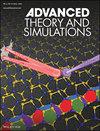De Novo Design of Energetic Molecules by Coupling Multiple Deep Learning Models
IF 2.9
4区 工程技术
Q1 MULTIDISCIPLINARY SCIENCES
引用次数: 0
Abstract
Molecular design is of great importance for developing next‐generation energetic materials. Machine learning methods have greatly accelerated the design of new energetic molecules. Currently, tailored deep learning models are urgently needed to deal with complex molecular structures and numerous property requirements. In this work, multiple deep learning methods, including graph neural network (GNN), variational autoencoder (VAE) and generative adversarial network (GAN), are constructed and coupled to design new energetic materials. The GNN model can quickly and accurately predict detonation properties based on molecular structures. A large database containing 749,314 nitrogen‐containing (N‐containing) molecules and their detonation properties is established. The coupled VAE‐GAN model can automatically generate new molecules that are similar to the given molecules. Given 436 typical energetic molecules, 1013 new molecules are generated, in which 13 molecules exhibit various advantages in certain detonation properties compared with typical explosives. The as‐developed deep learning models with the functions of generation and prediction can be applied to other fields of molecular design as a robust tool.耦合多个深度学习模型的高能分子从头设计
分子设计对于开发新一代含能材料具有重要意义。机器学习方法大大加速了新型高能分子的设计。目前,迫切需要定制的深度学习模型来处理复杂的分子结构和众多的属性要求。在这项工作中,构建并耦合了多种深度学习方法,包括图神经网络(GNN)、变分自编码器(VAE)和生成对抗网络(GAN),以设计新的含能材料。GNN模型可以快速准确地预测基于分子结构的爆轰特性。建立了包含749,314个含氮(N - containing)分子及其爆轰特性的大型数据库。耦合的VAE - GAN模型可以自动生成与给定分子相似的新分子。给定436个典型高能分子,产生1013个新分子,其中13个分子在某些爆轰性能上与典型炸药相比具有各种优势。具有生成和预测功能的深度学习模型可以作为一种强大的工具应用于分子设计的其他领域。
本文章由计算机程序翻译,如有差异,请以英文原文为准。
求助全文
约1分钟内获得全文
求助全文
来源期刊

Advanced Theory and Simulations
Multidisciplinary-Multidisciplinary
CiteScore
5.50
自引率
3.00%
发文量
221
期刊介绍:
Advanced Theory and Simulations is an interdisciplinary, international, English-language journal that publishes high-quality scientific results focusing on the development and application of theoretical methods, modeling and simulation approaches in all natural science and medicine areas, including:
materials, chemistry, condensed matter physics
engineering, energy
life science, biology, medicine
atmospheric/environmental science, climate science
planetary science, astronomy, cosmology
method development, numerical methods, statistics
 求助内容:
求助内容: 应助结果提醒方式:
应助结果提醒方式:


